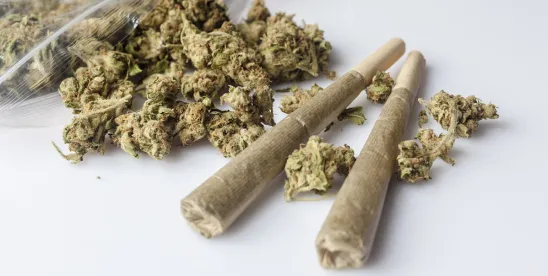The U.S. Drug Enforcement Administration will recommend that marijuana should be rescheduled from a Schedule I drug to a Schedule III drug, according to an announcement made April 30, 2024 by the U.S. Department of Justice. This means that marijuana would be considered a drug with “moderate to low potential for physical and psychological dependence.”
Under the federal Controlled Substances Act, the DEA classifies drugs into five distinct categories, or schedules, depending on the drug’s acceptable medical use and its potential for abuse or dependence. Schedule I drugs have a high potential for abuse and the potential to create severe psychological and/or physical dependence. As the drug schedule changes, so does the abuse potential, with Schedule V representing the drugs with least potential for abuse.
Marijuana has been a Schedule I drug since the inception of the Controlled Substances Act in 1970. Schedule I drugs are defined as having no currently accepted medical use and high potential for abuse. Examples of Schedule I drugs include heroin, LSD, Ecstasy, methaqualone and peyote.
Schedule III drugs are defined as drugs with a moderate to low potential for physical and psychological dependence. Some examples of Schedule III drugs are: Tylenol with codeine, ketamine, buprenorphine and anabolic steroids.
This move was expected after the U.S. Department of Health and Human Services recommended in August 2023 that DEA reschedule marijuana to Schedule III.
The DEA’s proposal now must be reviewed by the White House Office of Management and Budget. Once OMB agrees, DEA will then accept public comments. After the public comment period, an administrative judge will review the proposal. If accepted, the DEA will publish a final rule.
Once marijuana becomes a Schedule III drug, it will be available for medical use and can be prescribed by health care providers and dispensed by pharmacies. This reclassification also will relieve the tax burden on cannabis businesses and benefit the financial institutions who work with these businesses.
Impact on Employers
The most significant impact on employers once marijuana is permitted for medical use at the federal level is that there likely will be more legal claims asserted under the federal Americans With Disabilities Act related to requests for reasonable accommodations. Up until this time, ADA claims related to marijuana use generally were rejected by the courts because marijuana was an illegal drug at the federal level. Users of marijuana had to file claims under state law if the applicable state law permitted it.
Additionally, making marijuana a Schedule III drug at the federal level still leaves a conflict with state recreational marijuana laws that permit use of marijuana without a medical prescription. For employers who conduct drug testing, there still will be many different state and local laws impacting marijuana drug testing; the change at the federal level will not make compliance with those laws any easier.
Rescheduling marijuana to Schedule III also does not impact hemp products with no more than .3% THC which were legalized at the federal level a few years ago, although they are not being regulated. The Food and Drug Administration stated last year that it wants to work with Congress on “new regulatory pathways” for hemp and CBD products but no such “pathways” have materialized. In March 2024, twenty-one state Attorneys General signed a letter asking Congress to revise the Farm Bill that legalized hemp products to clarify that there can be no loophole for any products that cause intoxication. The letter pointed out that “ . . . the reality is that this law has unleashed on our states a flood of products that are nothing less than a more potent form of cannabis, often in candy form that is made attractive to youth and children – with staggering levels of potency, no regulation, no oversight, and a limited capability for our offices to rein them in.”
The proliferation of these hemp and CBD products also makes workplace drug testing complicated because drug tests generally cannot distinguish between marijuana, hemp and CBD and generally cannot detect recent use or current impairment.




 />i
/>i

